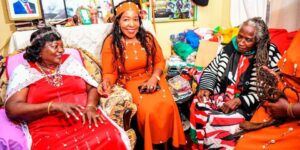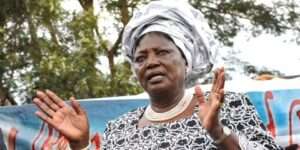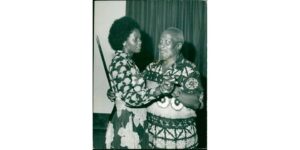As President Uhuru Kenyatta rides off into the sunset on conclusion of his second term as president of Kenya, it will not just be an individual exiting, but probably the end of a dynastic influence on the Kenyan political scene.
Apart from the outgoing president, one other person who might feel a great sense of loss is his mother Mama Ngina Kenyatta, the family matriarch who served as First Lady during the reign of Uhuru’s father, Mzee Jomo Kenyatta.
Since she was thrust into a public eye as a shy teenager bride to a much older Independence War hero, she hardly ever uttered a word in public. But as Kenya’s First Lady between 1963 and 1978, and then again as ‘First Mother’ from 2013, Mama Ngina was acknowledged as one of the most powerful persons in the country, in many ways the power behind the throne.
As First Lady, Mama Ngina was the quiet presence with a demure half-smile always walking one step behind the commanding figure of the liberation struggle hero. She cut the figure of a dutiful, reticent wife who knew her place and wouldn’t interfere as her husband busied himself in the all-male domain of matters of State.
African strongman
Away from the public appearances, however, Cabinet ministers and other politicians and government officials knew that at State House in Nairobi; the State Houses in Mombasa and Nakuru where President Kenyatta often retreated; as well as the private family home in the small township of Gatundu some 50km out of Nairobi, her word was law. The imposing Kenyatta may have cut the figure of the typical African strongman who brooked no dissent on the political arena, and on the domestic front firmly believed women and children should know their place.
However, he gave the girl he married as a fourth wife when she was just 18, and he was in his mid-50’s, extraordinary leeway on the home front.
On her husband’s death in 1978 she gave up the duties of First Lady to retreat to private life overseeing phenomenal growth of a vast family fortune. Then was thrust back into centre stage again 35 years later in 2013 when her first-born son, Uhuru Muigai, followed in the footsteps of the departed family patriarch on election as President of Kenya.

She didn’t move back into State House or perform any public duties, that was the preserve of the new First Lady, Uhuru’s childhood sweetheart Margaret, but it soon became common knowledge that Mama Ngina continued to wield extraordinary influence over her son, the second president of Kenya in her life. She eschewed controversy and stayed deep behind the scenes, but she was the family matriarch and on that score number one in the pecking order. The only time she generated controversy was in March this year after wading into the open rift between Uhuru and his Deputy President William Ruto, describing the latter as a person who had been badly brought up.
Blessed Uhuru and Ruto
Mama Ngina was addressing mourners at the funeral of her cousin in Gatundu, when she veered into politics, telling the gathering that their leader, her son, meant well for his people by dumping Ruto and instead choosing to work with opposition boss Raila Odinga. That intervention was a far cry from the last time Mama Ngina had made a public statement on the “UhuRuto” duo.
That was in the run-up to the 2013 elections at a well-attended gathering, also in Gatundu, when she came out of relative seclusion to publicly give her blessing to Uhuru and Ruto, who at the time were gearing up to run for presidency on a joint ticket while under the cloud of International Criminal Court indictment over the 2007 post-election violence. Ruto was also intending to put in his presidential bid in 2013, but after a long series of negotiations agreed to put his pursuit on hold and join the Uhuru ticket. A key factor in his settling for Deputy President was money.
Ruto simply did not have the kind of resources to match those readily available to the Kenyatta family to throw into a presidential campaign. And key to unlocking the campaign coffers was Mama Ngina, who even in advancing years retains a firm grip on the family business empire even if not in charge of day-to-day management.
Even as President, Mr Kenyatta defers to his mother a great deal as does his influential younger brother, Muhoho, who has a more direct hand in running the Kenyatta business empire.

Although generally seen to have little direct interest in politics, Mama Ngina has been known to leverage her influence to great effect. For instance, when Mzee Kenyatta died in 1978, the Gatundu South constituency parliamentary seat was kept in the family by his favourite nephew, Ngengi Muigai, who also represented the family interests on the boards of various corporations. Uhuru and his brother Muhoho were still minors at the time.
Ngengi Muigai retained the seat at the 1983 General Elections, but come the next polls five years later, he had fallen out with Mama Ngina after he reportedly uttered some slur against her. According to legend, she swore to teach him a lesson, and took her complaint to President Kenyatta’s successor, Daniel arap Moi. In short order, during the single-party regime when President Moi was experimenting with his novel queue voting system, Ngengi was drummed out of Parliament. It might be instructive that when Uhuru made his political debut in 1997 gunning for the ‘family’ seat, he came up against Ngengi’s brother Capt Kungu Muigai, self-styled boss of one of the myriad Kikuyu Elder’s groups, has defied the family line to back Dr Ruto’s presidential campaign.
Kungu and Ngengi are sons of the late President Kenyatta’s half-brother James Muigai, so it could be a family feud that goes back to inheritance of the founding father’s properties. Their sister, Senator Beth Mugo has, by contrast, since the 1970s been a key confidant and business partner of Mama Ngina.
Apart from the 1988 elections, Mama Ngina had come to depend on Moi in many other ways. When President Kenyatta died, he left behind a sprawling and uncoordinated wealth portfolio, most of it tied up land transferred from public ownership, but with the paperwork incomplete.
She depended on President Moi see to completion of the land transfers and issuance of title deeds. She was of limited education herself, and her own children were still in school. The elder step-children from Mzee Kenyatta’s earlier marriages were of age and also looking to their inheritance.
From President Moi, she learnt the value of stepping back and engaging professional managers, not family and relatives, to look after the business side of things. It is to her credit that the holdings she inherited were consolidated into the modern and giant business conglomerate with a wide variety of interests in hotels, banking, insurance, agriculture, food processing, real estate, education and media.
Born in 1933, Mama Ngina was the daughter of a colonial chief Muhoho wa Gathecha, and therefore was actually of elite blood while the Jomo Kenyatta who married her in 1951 was a mere commoner. She was 18 and he was in mid-fifties and already acknowledged leader of the freedom struggle.

Just one year into the marriage, her husband was arrested by the colonial authorities on declaration of the State of Emergency as reaction to the Mau Mau insurgency intensified. She was left alone to look after her new-born child, a daughter Kristina Wambui,
She was not to re-unite with her husband until 1960 when he completed a seven-year term, but remained under detention in a desolate part of northern Kenya. Mama Ngina was allowed to visit Kenyatta in her Kapenguria detention home, and that is where her second child and first son, Uhuru, was conceived. The future president was born on 1961 followed by a sister Anna Nyokabi in 1963 and youngest brother Muhoho in 1965.
Mama Ngina’s continuing tight grip on family financial affairs was illustrated in October last year with the leaked Pandora Papers identifying her as principal beneficiary of vast holdings in secret accounts in offshore tax havens.
The secret assets uncovered the International Consortium of Investigative Journalists listed Mama Ngina as First Benefactor and Uhuru Kenyatta as Second Benefactor. Although no evidence was wrongdoing was disclosed, secret accounts in places such as Panama, Switzerland, Bermuda, Jersey and Malta for those out to stash illicit funds or hide wealth form tax authorities.
The exposure embarrassed Uhuru, who was trying to position himself as the president committed to fighting corruption. He said he welcomed the report and promised to issue a comprehensive explanation on return from an overseas visit, but has never uttered a word on the matter since.
Credit: Source link